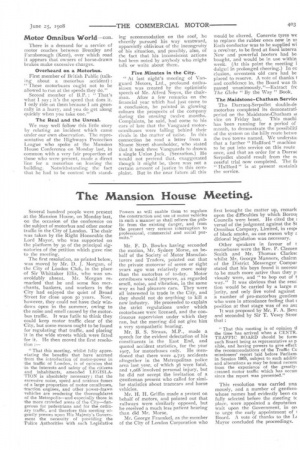The Mansion House Meeting.
Page 7

If you've noticed an error in this article please click here to report it so we can fix it.
Several hundred people were present at the Mansion House, on Monday last, on the occasion of the conference on the subject of motorbus and other motor traffic in the City of London. The chair was taken by the Right Honorable the Lord Mayor, who was supported on the platform by 30 of the principal signatories of the petition which gave rise to the meeting.
The first resolution, as printed below, was moved by Mr. D. J. Morgan, of the City of London Club, in the place of Sir Whittaker Ellis, who was unavoidably absent. Mr. Morgan remarked that he and some 800 Trier'chants, bankers, and workers in the City had enjoyed the quiet of Broad 'Street for close upon so years. Now, however, they could not have their windows open in the summer, owing to the noise and smell caused by the motorbus traffic. It was futile to think they could keep motor traffic clear of the 'City, but some means ought to be found for regulating that traffic, and placing 'it in the wide streets which were fitted 'for it. He then moved the first resolution :— " That this meeting, whilst fully appreciating the benefits that have accrued from the introduction of motor-power in the traffic of London, is of opinion that in the interests and safety of the citizens and inhabitants, amended LEGISLATION is absolutely necessary ; that the excessive noise, speed and noxious fumes of a large proportion of motor omnibuses, -traction engines, and other power-drawn vehicles are rendering the thoroughfares of the Metropolis—and especially those in the more crowded areas of the City—dangerous for pedestrians and for the ordinary traffic, and therefore this meeting urgently presses upon His Majesty's Government the necessity of providing the 'Police Authorities with such Legislative
Powers as will enable them to regulate the construction and use of motor vehicles in such a manner as shall relieve the public from the existing danger, and from the present very serious interruption to professional, commercial and social pursuits."
Mr. F. D. Bowles having seconded the motion, Mr. Sydney Morse, on behalf of the Society of Motor Manufacturers and Traders, pointed out that the private motorcar of seven or eight years ago was relatively more noisy than the motorbus of to-day. Motor omnibuses would improve, as regarded smell, noise, and vibration, in the same way as had pleasure cars. They were all interested in trade in the City, and they should not do anything to kill a new industry. He proceeded to explain the strict regulations under which motorbuses were licensed, and the continuous supervision under which they ran, but the meeting did not give him a very sympathetic hearing.
Mr. B. S. Straus, M.P., made a speech for the evident delectation of his constituents in the East End, and quoted accident statistics, for the year 1907, for motorbuses only. He mentioned that there were 4,723 accidents altogether in the Metropolitan police area last year, of which 36 were fatal, and r,o68 involved personal injury, but he did not accept the invitation of a gentleman present who called for similar statistics about tramcars and horse vehicles.
Mr. H. H. Griffin made a protest on behalf of motors, and pointed out that railways were similarly opposed, but he received a much less patient hearing than did Mr. Morse.
Mr. George Fraenkel, as the member of the City of London Corporation who
first brought the matter up, remark upon the difficulties by which Borotu Councils were beset. He cited the versal of the judgment against the St Omnibus Company, Limited, in tesp( of black smoke, as one reason why r ditional legislation was necessary.
Other speakers in favour of t motorbuses were the Rev. P. Clemen Smith and Mr. Thomas Clarksc whilst Mr. George Manners, chairm of the District Messenger Compar stated that his boys found it necesse to be much more active than they p viously were, and "to hop out of t way." It was obvious that the reso. tion would be carried by a large it jority, and only five voted against a number of pro-motorbus gentlem who were in attendance feeling that t position at that stage was of no aye
It was proposed by Mr. F. A. Bev: and seconded by Sir T. Vesey Strom' that :
"That this meeting is of opinion tl the time has arrived when a CENTR, TRAFFIC BOARD should be form, such Board being as representative as p sible, and having powers to give effect the recommendations of the Traffic Co missioners' report laid before Parliam. in Session 1905, subject to such additic and alterations as may be found necem from the experience of the greatly. creased motor traffic which has occur] since the report was presented."
This resolution was carried una mously, and a number of gentlern. whose names had evidently been .ca fully selected before the meeting tc place, were appointed a deputation wait upon the Government, in or to urge the early appointment of Board. A vote of thanks to the L( Mayor concluded the proceedings.


















